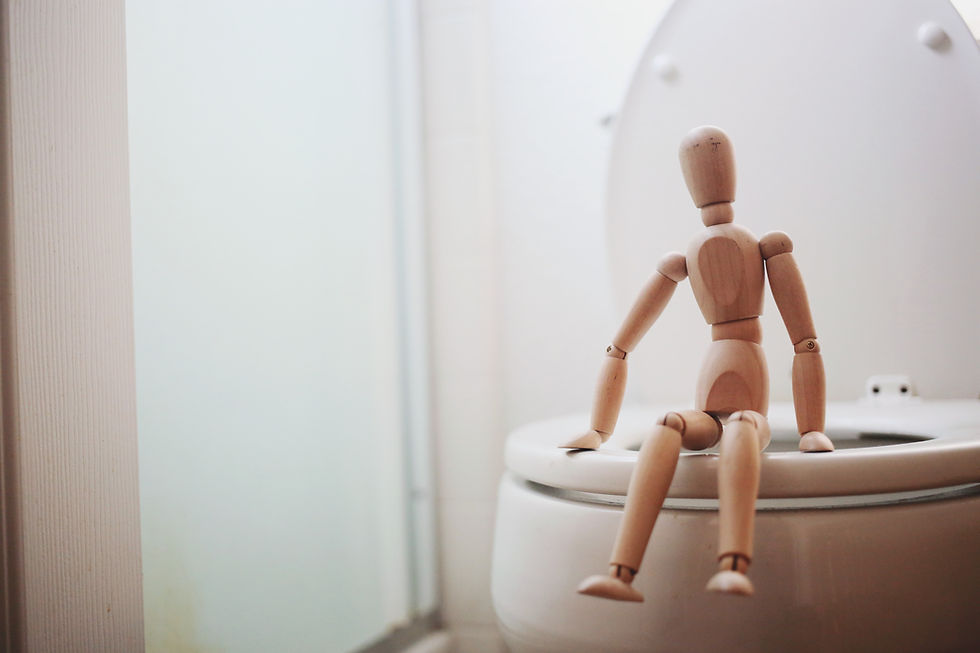Parkinson's Disease and Constipation
- Jud Eson
- Mar 21, 2023
- 4 min read
Updated: Jun 12, 2023
Constipation is extremely common in those with Parkinson’s. In fact, up to 66% of all people with PD experience constipation. This is higher than the general population which is about 20%. Constipation can be physically uncomfortable, but it can also impact the effectiveness of your medication as it can limit how much is absorbed through the gut.

What is the cause of constipation?
Research has shown that there is a link between our bacteria in our gut and Parkinson’s disease. While there are no definitive answers, there is a common finding that there is a higher quantity of certain families of bacteria (Lactobacillaceae and Verrucomicrobiaceae), and others (Prevotellaceae) are found to be lower in those with Parkinson's disease.
Other reasons are thought to be physical weakness, lifestyle risks like low fluid intake, and medications.
Physical activity and exercise helps stimulate your digestive system. Even the effects of gravity when standing can help stool move more easily. Physical weakness can limit how much physical activity and exercise you can do.
Dehydration commonly leads to constipation, and many older adults purposefully limit their fluid intake due to not use the bathroom as much. These decisions can greatly impact many health systems, one of which is your digestive system.
Check your medications and talk with your doctor. Several common medications have constipation as a side effect. Take a look at this list of medications. If you are taking one, talk with your doctor about if this medication is right for you.
Narcotic pain medications (e.g Vicodin)
Iron supplements
Antacids that contain calcium (e.g. Maalox) or aluminum (e.g. Mylanta)
Overuse of over-the-counter laxatives (e.g. Metamucil)
Some anti-depressants (e.g. Zoloft)
Calcium channel blocker medication used to treat high blood pressure and heart disease (e.g. nifedipine)
Some diuretic medications (e.g. chlorthalidone)
Medications used to treat Parkinson's disease - Levodopa, dopamine agonists, and anticholinergics, such as trihexyphenidyl (Artane)

Ways to reduce/avoid constipation
Drink half of your body weight in ounces. Water increases flow through the digestive tract. Warm water or prune juice can help stimulate a bowel movement especially if consumed in the morning. While caffeine can stimulate your digestive tract, it along with alcohol and hot weather can lead to dehydration.
Add more fiber to your diet. As you increase your fiber intake, you must also increase your fluid intake. Fiber and fluid work together to normalize bowel movements.
If your diet is low in fiber, do not try to pack your meals with fiber. This can lead to gas, cramping, or bloating to worsen. Instead, gradually add in more high-fiber foods so your digestive system can adjust.
There are two forms of fiber, soluble and insoluble
Soluble fiber means fiber that dissolves in water. This form of fiber will form a gel to add bulk to the stool. The gel also acts as a natural stool softener which helps make bowel movements pass with more ease.
Common forms of soluble fiber include whole grains, apples, bananas, cooked vegetables, and oatmeal
Insoluble fiber is material that we cannot break down throughout the digestion process. It helps increase movement within our digestive system.
Common forms of insoluble fiber include skins and seeds of fruit and vegetables, popcorn, leafy greens, nuts, and dried fruit.
Eat smaller meals throughout the day. Smaller meals may allow more time for digestion, instead of big meals. Make sure you talk with your neurologist about timing with food and medication as what you eat and when you eat it can impact how much of your medication is absorbed.
Try probiotics and prebiotics. Probiotics are bacteria that can help balance the “good” and “bad” bacteria, while prebiotics help the “good” bacteria have more energy. There are supplements you can take, but it is always recommended to get it naturally first! Remember, supplements are not regulated by the FDA so if you do get supplements make sure they are third party tested.
Foods with probiotics include sauerkraut, kimchi, miso, yogurt, and fermented veggies
Foods with prebiotics include mushrooms, asparagus, seaweed, chickpeas, lentils, and kidney beans
Exercise regularly. Exercising will help stimulate our digestive system and keep things moving smoothly. There are so many exercise classes in the Albany, Troy, Schenectady, and Saratoga area that can help you improve your fitness! Check out our website to find exercise classes near you.
Give yourself an abdominal massage to help the gut move.
Foods to avoid when constipated
High fat foods, or foods that are rich in oil, butter, and grease, can be detrimental to your digestive system. If you struggle with constipation, or are taking medication with constipation side effects, or are not physically active, try to avoid the following list of foods to reduce your risk of constipation.
Commercially baked goods
Fried food
Processed meats
Cheese
Red meat
Refined carbs
Frozen dinners
Keeping your gut healthy and moving is tricky business. If you are constipated, definitely talk with your neurologist and primary care/general practitioner, as constipation can impact the dosage of Parkinson's medication prescribed and should be considered when prescribing other medications. Ask your doctor about seeing a Registered Dietitian to take a deeper look at your diet to make changes that are right for you.
Sources:
